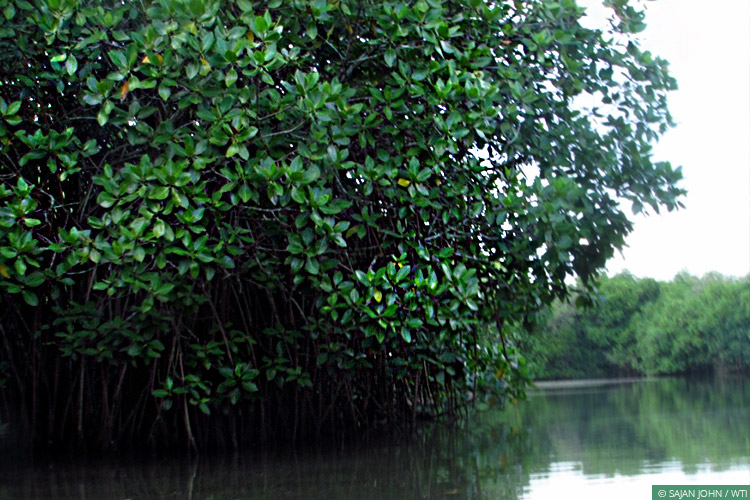PARTNERS: Apollo Tyres Ltd, Kerala Forest Department
PROJECT LEAD: Sajan John (sajan@wti.org.in)
TO COINCIDE WITH THE INTERNATIONAL DAY FOR BIOLOGICAL DIVERSITY on May 22, 2016, WTI, in partnership with Apollo Tyres, announced the launch of a critical mangrove restoration project in the Kannur district of Kerala.
The Kannur Kandal Project – ‘kandal’ being the Malayalam word for mangroves – aims to ensure the survival of existing mangroves and increase the acreage of such coastal wetlands across Kannur, potentially making it a prototype for other coastal districts in Kerala and the rest of the country.
 Kannur has 7.55 sq km of mangroves, i.e. around 45% of Kerala’s total mangrove forest cover. Nearly 90% of these forests are under private ownership and are therefore highly threatened.
Kannur has 7.55 sq km of mangroves, i.e. around 45% of Kerala’s total mangrove forest cover. Nearly 90% of these forests are under private ownership and are therefore highly threatened.
Mangrove forests are unique ecosystems, extremely rich in biodiversity, growing along inter-tidal coastal habitats such as shorelines, estuaries and backwaters. They are both refuges and nurseries for a large variety of threatened terrestrial and aquatic species, and an important source of fodder, medicines and firewood for people living in coastal communities. They also act as barriers against cyclones and tsunamis (evidenced in their important role in reducing the impact of the 2004 Indian Ocean tsunami), prevent coastal erosion, and maintain inland water quality by preventing sea water intrusion.
Mangrove forests have faced considerable destruction the world over, with less than half of the original acreage remaining
However, mangrove forests have faced considerable destruction the world over, with less than half of the original acreage remaining. About half of that loss has occurred in the last 50 years, and a significant amount in just the last two decades, especially due to human population growth and intrusive development. (Data from Global Forest Watch, an online forest monitoring platform, shows that the world lost 192,000 hectares of mangroves between 2001 and 2012.)
The acreage of mangroves in Kerala has also reduced drastically over the years, with only 1750 hectares of an estimated historical 70,000 hectares remaining. Conversion into coconut plantations or other agricultural land, aquaculture, unscientific water regulation, population pressures, real estate development, inadequate enforcement of laws, etc have all contributed towards mangrove destruction.
Kannur has 7.55 sq km of mangroves, i.e. around 45% of Kerala’s total mangrove forest cover. Nearly 90% of these forests – which support at least 10 species of mangroves (including the uncommon Rhizophora apiculata), 87 species of fish, 83 species of birds and 13 species of mammals – are under private ownership and are therefore highly threatened.
The WTI-Apollo Tyres project is based in Kunhimangalam village, which is one of the largest mangrove villages of Kerala. Land secured with the support of the international NGO World Land Trust has been used to establish a Mangrove Interpretation Centre, located in the natural ecosystem, for mangrove-based research and education, and the promotion of mangrove restoration through community and government participation. A mangrove nursery has been established and community-based initiatives launched to enhance public awareness and reduce threats to mangroves. Special efforts are being made to generate scientific interest about mangroves among the youth.